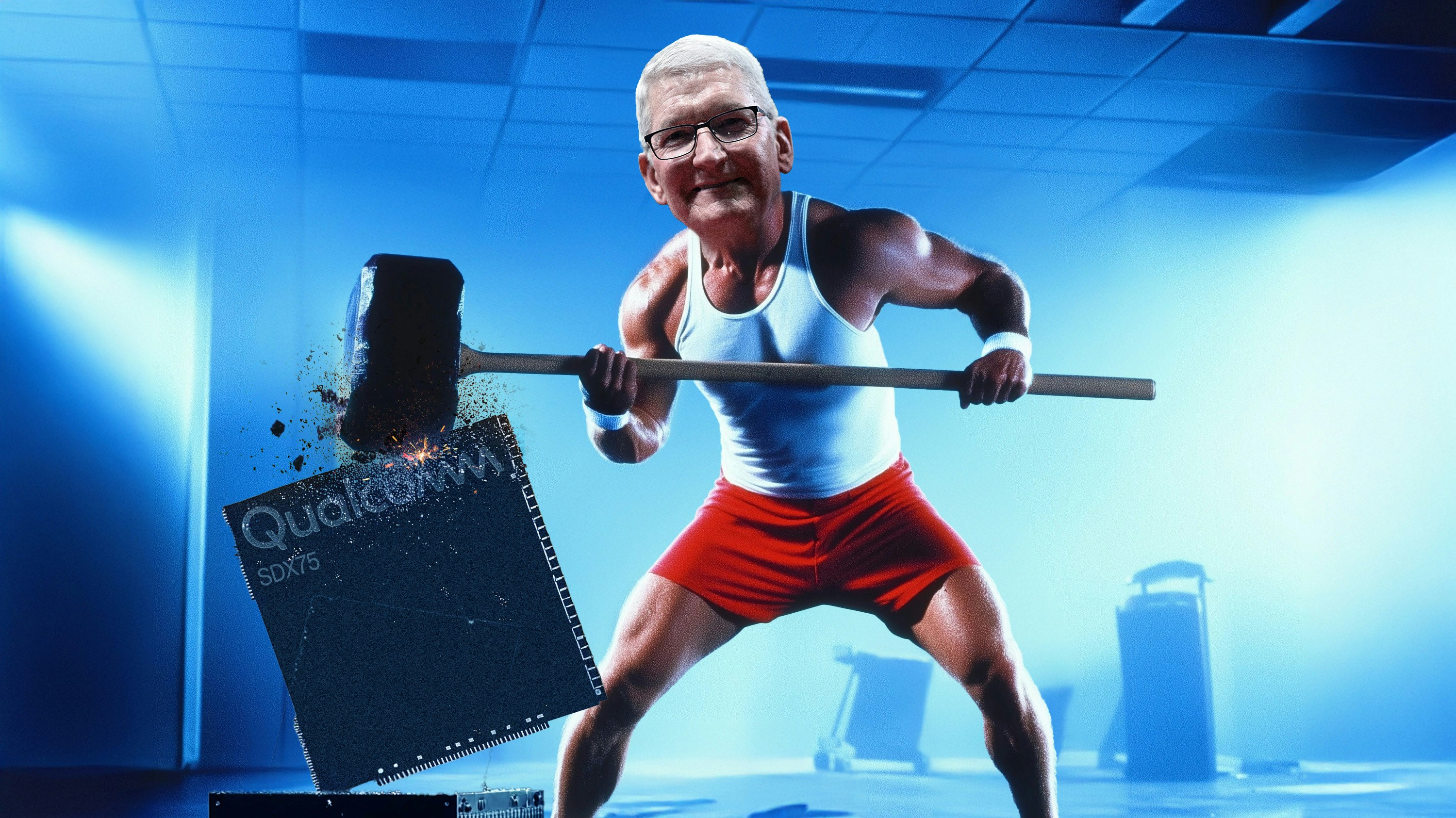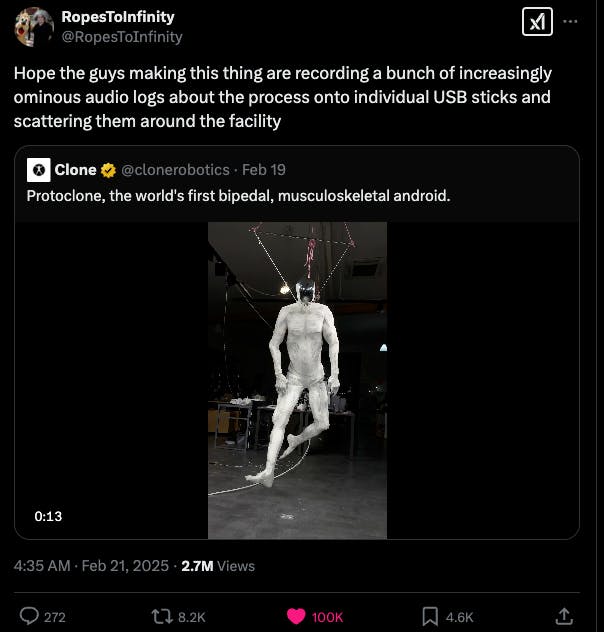Altman Gets The New York Treatment

Welcome, Weekenders! In this newsletter:
• The Big Read: How Apple and Qualcomm share tech’s rockiest marriage
• Policy and Safety: New push for safety laws could lift parents fatigued by tech worries
• The Top 5: Silicon Valley’s favorite snow toys
• Shopping: Tech’s winter it item? The humble woolen ski sweater
• Plus, our Recommendations: The podcast disassembling “Severance”; a godfather who gets another life; and the Hilary Duff show you missed
On the night I saw “Doomers,” a new play based on Sam Altman’s sudden firing from OpenAI, I found myself seated next to the founder of another AI company. During intermission, he turned to me and said, “I think some people will see this and assume it’s a caricature. But this is actually how these people talk!”
“Doomers” covers a single 24-hour period in which Seth, a fictionalized Altman, schemes to win back his job and get back to creating artificial general intelligence. There’s also Myra, a stand-in for Mira Murati, the former OpenAI executive who briefly led the startup before Altman’s rehiring; in the play, Myra tries to keep the company running while managing Seth’s bruised ego. His machinations with his inner circle take up the first act, while the plot shifts to the board’s deliberations in the second.
Watching “Doomers” took me straight back to that moment in 2023 when OpenAI ousted Altman, and as someone who ended up writing at length about that episode, I was impressed by the amount of homework playwright Matthew Gasda must’ve done.
Gasda does have some experience with zeitgeisty theater, having previously done “Dimes Square,” a 2022 play about the New York neighborhood that became popular during covid among very online, edgelord-ish young people. To give real verisimilitude to “Doomers,” he pored over Altman’s X posts, effective altruism blogs and AI-focused podcasts. “For a group of people that’s supposed to be weird about communication, the AI community has talked exhaustively about itself,” he told me earlier this week. He also spent time fooling around with OpenAI’s ChatGPT and Anthropic’s Claude—so much time, in fact, that he winkingly chose to credit the chatbots in the program.
Gasda also took several trips to San Francisco to embed with “people working high up in the AI world.” (He declined to say who exactly.) The cadence of these sparring conversations often reminded him of people he encountered on his college debate team—only “really powerful and rich,” he said.
In March, the show will head from New York to San Francisco for 11 performances before returning east for another short run in April. Gasda isn’t sure what to expect from the San Francisco audiences after having done two early readings there while he was still workshopping the show. One crowd was “EA, rationalist, progressive,” he recalled, while the other was more “the Thiel-Sacks libertarian right.” The difference in feedback, he said, was stark. Unlike the rowdier right-wing audience, “the EA crowd didn’t laugh and didn’t drink. It was terrifying.”
The 10 characters in “Doomers” represent a similar spectrum as they debate the merits of AI safety versus speeding up AI development. Gasda’s script manages to deftly satirize them all without discounting any of their arguments—a nuance reflected in the playwright’s own feelings about AI’s future. “I vacillate between really heavy pessimism and begrudging optimism,” he said. “I think that the characters who split the difference are the ones that are probably closest to my own point of view.”—Julia Black
What Happens Next With AI Hardware?
RIP, Humane. We hardly knew ye.
Indeed, Humane died such a gruesome death—selling itself to HP for $116 million, roughly a tenth of its most recent valuation—that I haven’t been able to stop thinking about its self-immolation and what it suggests about this moment in the AI boom.
Here’s one straightforward thought: What a vindicating moment for Marques Brownlee and the other tech journalists—yes, I’m claiming the YouTuber as one of our own—who reported honestly about Humane’s immense flaws. (So did our Julia Black.) Often, stories about what’s going wrong with a company inspire Silicon Valley’s reactionary set to dismiss the coverage as unfair and a sign of anti-capitalistic bias. Maybe Humane proving those stories correct can change a couple minds about what motivates most journalists: the chance to find the truth, not kneecap anyone.
For a minute, I wondered if Humane’s implosion might mean the AI hardware era had ended before it had ever really begun. But I think it’s pretty clear how AI features in gadgets like augmented-reality glasses make good sense, and as our Martin Peers talked about last summer, devices like Meta’s Ray-Bans are getting pretty good—and pretty popular. A week ago, EssilorLuxottica, the Ray-Ban parent company that has partnered with Meta, said it is preparing to boost production several-fold to 10 million glasses a year, and it is exploring the possibility of releasing Oakley-branded glasses with Meta, too.
I do think Humane’s collapse means any successful AI hardware is going to come from one of the tech giants. It’s really tough to envision investors wanting to turn over more money to an AI hardware startup—especially when they can look over at the Humane investors walking away with bubkes. And with Humane’s death coming less than a year after its device debuted, it’s hard to see customers again trusting a startup to produce a worthwhile device—especially since it will surely cost a pretty penny. It’ll take a company with significant existing brand power to convince people to take another chance.—Abram Brown
The Big Read
Apple Versus Qualcomm: A Split Looms in Tech’s Rockiest Marriage
It’s a little hard to pinpoint just one moment that encapsulates how much Apple and Qualcomm dislike each other. The two have feuded for years and years and remain shackled to each other for complicated reasons like royalties and patent disputes. There was the very telling episode back a decade ago when Steve Mollenkopf, then Qualcomm’s CEO, chose to show his displeasure with Apple by spending a meeting with the company’s executives on his phone swiping through pictures of his dog, our Wayne Ma reports in this week’s Big Read.
The animosity has only intensified in recent years as Apple has made moves to develop its own technology, which would reduce its reliance on Qualcomm’s wireless modems, an essential part of many Apple devices. Huge dollars are at stake: Business with Apple amounts to nearly a quarter of Qualcomm’s annual revenue, and if Apple can break away from Qualcomm, the iPhone maker will save billions of dollars in manufacturing costs.
Policy

Parents Are Over Policing Kids’ Tech Use. A New Push for Laws Could Help
Fears about how kids use technology aren’t new, but the intensity of that anxiety has certainly reached new heights. Lawmakers are pledging new regulatory legislation to better protect children—even as the technology continues to rapidly change. Meanwhile, the most active and tech-savvy parents are finding themselves in an uphill battle to keep their families safe. As one mother told our Paris Martineau: “This stuff is like trying to pin down a shadow. The second that you think you’ve done it right, it resets or it updates or the kids get really smart and they find workarounds.”
The Top Five

The New Snow Toys That Tech Moguls Love
A snowmobile? A classic choice. But what about a snow bike—or a snow kite? When Weekend contributor Annie Goldsmith went out to find the best new snow toys, she practically stumbled into an avalanche of snow kite enthusiasts like Daphne De Jong, CEO and founder of Ven, a data science startup. “This is my favorite hobby, and one of the main reasons is it combines snow sports, mountains, but also aerodynamics,” de Jong said. “It’s kind of engineer-y.”
Shopping

Tech’s Winter It Item: The Humble Ski Sweater
Snow sports enthusiasts are tossing technical gear and synthetic fabrics in the back of the closet, while old-fashioned wool sweaters, beloved partly for their retro appeal, are back in vogue. Kevin Luzak, founder of Cache Seven, a social media startup, has been an evangelist for the garments for years: “It may be pure fashion to some, but wool performs great, and I love seeing all these sweaters out there again.”
Abram Brown, editor of The Information’s Weekend section, may just put in for his Social Security benefits now and hope for the best. Reach him at abe@theinformation.com.

Listening: The Svengalis of ‘Severance’
Struggling to make heads or baby goat tails of the latest season of “Severance”?
I suggest you follow the rhythm I’ve adopted: Watch the latest episode, think to yourself, “The eff was that all about?” and then fire up the latest episode of “The Prestige TV Podcast,” one of The Ringer’s finest offerings. Hosts Joanna Robison and Rob Mahoney are an amiable pair and old hands at taking apart a mystery box show. They quite impressively nailed the truth behind the season’s Helly R. twist from the beginning, and they have really made me think more about the show’s consistent descent-to-hell symbolism. Indeed, as Virgils come, they’re quite excellent.—A.B.
Reading: A Don’s Resurrection
Often, something wonderful and Italian gets discovered—or rediscovered. The Italians found themselves constantly at work on this task during the Renaissance. We all have the same opportunity now to do the same with Giuseppe di Lampedusa’s “The Leopard,” a cult-favorite novel initially published under extraordinary circumstances in 1958: The author had died the year earlier without finding a publisher for his novel. But then a copy got passed to Feltrinelli—the Italian publishing house that had earlier smuggled “Dr. Zhivago” out of the USSR—and “The Leopard” became a smash hit in Italy and then a Burt Lancaster film a few years later. Ahead of a Netflix TV adaptation coming next month, Feltrinelli has filled its stores with a new edition of the novel, and the displays lured me to pick up a copy last week in Rome. (I expect Barnes & Noble stores will give it similar treatment quite shortly.)
Di Lampedusa, a Sicilian prince, borrowed parts of his own life and his family’s history for the “The Leopard,” which mostly focuses on a family of Italian aristocrats in the 1860s just as the Risorgimento civil war breaks out. The clan is led by Don Fabrizzio, the erudite and pragmatic Prince of Salina who sees the revolution as inevitable and embraces it, hoping to preserve his family’s wealth. His nephew, Tancredi, becomes a soldier in the struggle and utters the novel’s famous line: “If we want things to stay as they are, things will have to change.” The novel is brisk and told with a meta-ish wry humor. In one aside, Di Lampedusa describes a palazzo’s magnificent ceiling—frescoed with the Roman gods—and then its humble demise in the following century from a bomb made in good ol’ Pittsburgh. The flash forward underlines the tension present through “The Leopard”: Not even immortal deities—nor the best-intentioned Sicilian princes—can forestall change forever.—A.B.
Watching: What’s Old Is New Again
Comedies that make you laugh out loud—frequently—are to be treasured. And in that fairly small category is “Younger,” a Paramount Global production from a decade ago that is getting a new life on Netflix. The story of a 40-year-old mother who poses as a 26-year-old to get a job in the publishing industry—where she had worked before having a child—is eminently binge worthy and enormously entertaining.
Starring Sutton Foster, who was 40 when the show began, as well as Hilary Duff, Debi Mazar, an excellent Miriam Shor and Peter Hermann, the show didn’t get the recognition it deserved when it first aired—likely because Paramount Global programmed it on the niche cable channel TV Land. Fortunately, Netflix is giving it the attention it deserves.—Martin Peers
Final Thought
Uhhh, everybody stop and save your progress now.



